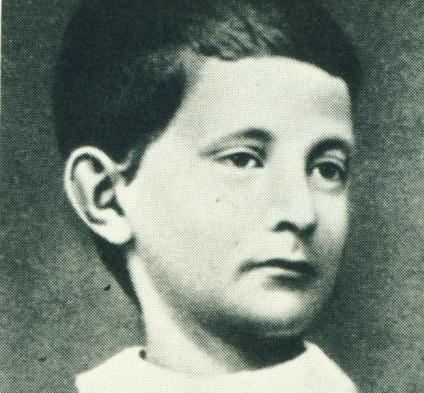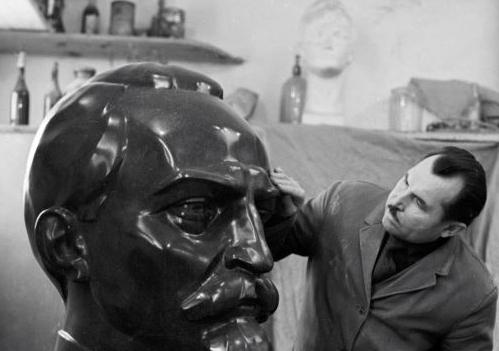The party of the Bolsheviks was led by different people. Some of them were brilliant speakers, others were distinguished by outstanding organizational abilities, others stood out by their stunning brutal brutality. A special place in party iconography is occupied by Dzerzhinsky Felix Edmundovich. Quotations from his speeches and just phrases that he casually dropped testify to the ambiguity of nature and a peculiar talent. On the one hand, they demonstrate a lively mind, a certain romance of worldview and sound reasoning, and on the other, they are in direct conflict with the methods of its work. The time, of course, was difficult, but people made it that way.
Conflicting icon
The portrait of Felix Dzerzhinsky in Soviet times adorned the walls of the offices of all organizations that inherited the functions of the Cheka (OGPU, MGB, KGB, Ministry of Internal Affairs), and the monument stood in the center of Lubyanka Square, directly opposite the building of the former Rossiya joint-stock company, which provided insurance services before the revolution. AO disappeared, and fear remained for a long time, all the time the USSR existed. The apparatus of coercion for the state is necessary, especially for the people and the proletariat. At the very beginning of the development of the concept of its mechanism, stood Felix Edmundovich Dzerzhinsky. The paradox of this situation (it is possible that the pattern is also true) is that he himself spent a significant part of his life in exile and prisons, suffering for his disagreement with the then prevailing social system. The experience gained by the “Iron Felix” in those years was taken into account by him. The Soviet system of suppressing discontent turned out to be much stronger, tougher and more effective than the imperial.

Landowner family and childhood spent in it
On September 11, 1877, a son named Felix appeared in the family of a gymnasium teacher, E. I. Dzerzhinsky, of Catholic religion. The social status of the father of the future chairman of the Cheka could be attributed to the landlords, although small, he owned only the Dzerzhinovo farm.
The family was large, except for Felix, brothers and sisters grew up in it (Ignatius, Kazimir, Stanislav, Yadvig, Aldon, Vladislav and Wanda), and, apparently, the lack of funds forced the poor gentry to work in the field of public education. When Felix was already a youth, a tragedy occurred on the farm, and the daughter of Edmund Iosifovich died from an accidental shot. They did not begin to sort out who was responsible for the death of Wanda, the investigators concluded that an accident had occurred due to negligence.
Gymnasium friend Józek Pilsudski and academic success
At the age of ten, Felix met another future great Pole, Yusek. The friends studied together for eight years, not realizing that one of them would become a professional revolutionary, and the other a convinced anti-communist. It was Jozef Pilsudski who would be able to repel an attack of the Red forces in 1920, the rear of which would be commanded by Dzerzhinsky Felix Edmundovich. Nationality for a real Bolshevik is not so important, if necessary, you can attack your native country.
High school student Felix did not show special talents. In the first grade, he studied for two years. Grammar school cannot be considered completed, he did not receive a certificate, only a certificate indicating that “good” (but not “excellent”) was given to him the Law of God, but in Latin, French, physics, geometry, algebra and history his successes were evaluated on the solid "three". And the situation was very bad with the Greek and Russian languages. And all this with satisfactory diligence, behavior and attention.
The beginning of the revolutionary struggle
So, the young man left the walls of the gymnasium. It was clear to everyone: both teachers and fellow practitioners, and to himself that he did not shine with any special inclinations and talents. A rich inheritance was also not to be expected. And then the young man became interested in Marxism (then this idea actively took possession of rebellious minds). Enrolled in an underground circle and Dzerzhinsky Felix Edmundovich. The real surname, apparently, seemed to him too Polish and not romantic enough, and he took the nickname Astronomer. Why exactly this, about which the story is silent. Carrying out campaigning among poorly educated students and apprentices (enough for this education), the Astronomer made a mistake, as a result of which one of the low-skilled workers promoted by him wrote a report to the police of the appropriate content - and Felix Edmundovich Dzerzhinsky ended up in the Kovensky prison (1897 ) After a year of imprisonment, he was sent to Nolinsk, Vyatka province, under three-year police supervision, but even here, while working as a sweeper in a tobacco factory, he did not refuse the revolutionary idea. Link again, then escape.
A life full of romance: arrests, links, and escapes
Vilno, Lithuania, Poland - these are the places on the geographical map in which Dzerzhinsky Felix Edmundovich acted at the turn of the century. His biography is replete with episodes of arrests and sentences. Warsaw Citadel (1900), Siedlec Central (1901), Vilyui transit prison (1902), Alexander Link and romantic escape from Verkholensk by boat. Then emigration, in which a party career begins during the Social Democratic Conference of Poland and Lithuania. Now he is the secretary of the foreign committee.
Arrests and releases become more interesting
When the war with Japan began, the Polish-Lithuanian social dedeks (SDKPiL) did everything in order to complicate the economic situation of the Russian Empire. Demonstrations, riots, strikes and even sabotage were actively carried out by the military wing of the party, for which its leaders were again in prison. One can only wonder at the softness of royal sentences. Felix Edmundovich Dzerzhinsky in 1905 was thrown into prison. It was in July, and in October he was already amnestied. December 1906, arrest in Warsaw and trial, and in June release on bail. 1909, the verdict is a lifelong Siberian exile, from which it turned out to be a simple matter to flee, and not just somewhere, but directly to Maxim Gorky on Capri. Can anyone repeat this now?
Before the revolution
In 1910, an important event occurred in the life of the party secretary (and part-time treasurer) - he married. His chosen one was Sofia Mushkat, a comrade-in-arms. In his diary notes of this time there are lines about love, which gives strength to endure all hardships. Previously, only in the struggle did Dzerzhinsky Felix Edmundovich see the meaning of life. His brief biography contains information that in 1910-1911 he supported the Leninist position, opposing Plekhanov with his legal methods. In 1912 he was again arrested, this time more effective repressions were applied to the malicious rebel and fugitive - first three years of hard labor (Oryol Central), then six more in Butyrka, where he would probably sit until 1922, if not February revolution.
Jacobin of the proletarian revolution
After combining the SDKPiL with the RSDLP (b), Felix Edmundovich Dzerzhinsky immediately becomes involved in active party work. There are no dogmas yet, positions are only being determined, and on such an important issue as the self-determination of nations, the secretary is opposed to the Leninist course, but this is temporary. It is not the word that matters, but the matter, for example, the organization of an armed coup, the formation of Red Guard combat units and the seizure of communications centers on October 25th. Dzerzhinsky was even a drug commander for almost the entire summer of 1917, before this post was accepted by L. D. Trotsky. Lenin called him a Jacobin, and that was a compliment. The party urgently needed a man who could create and head a special body, punishing and merciless, and this case was entrusted to the “iron” Felix.
Terror and a bit of Trotskyism
In December 1917, a real threat arose of the all-Russian strike of civil servants. The People's Commissar reacted to it by creating the All-Russian Extraordinary Commission to Combat Sabotage. Here it was led by Dzerzhinsky (in 1922 it was renamed OGPU) until his death. The Cheka took part in mass repressions, and its head often became the initiator of actions on the percentage destruction of the population and the complete extermination of representatives of the "parasitic classes." Only once did he terminate his duties by resigning. This happened after the assassination of Mirbach, the German ambassador, committed to disrupt the peace (and in fact capitulation) negotiations in Brest. At this moment, Dzerzhinsky took the Trotskyist position, in which he later repented several times. In all other respects, the “iron” Felix Sovnarkom arranged: he carried out purges, took hostages, and shot them. He saw nothing terrible in his activity.

Children, sports, repression, internal party struggle and death
The civil war ended, and the consequences of this criminal fratricidal massacre opened in all horror. Industry was destroyed, devastation reigned everywhere, the country was flooded with street children. Five million surviving children were left without parents, and the death toll is impossible to calculate today. Felix Dzerzhinsky became the initiator of an important state program for growing the generation of the war-affected people, which should not only be fed, dressed and shod, but also brought up in the spirit of the new social system. To this end, orphanages, special detention centers and children's communes were created throughout Russia. This project can be called one of the most successful in Soviet history.
Few people today remember that Dzerzhinsky Felix Edmundovich, whose photo (especially later ones) suggests his ill health, has become one of the main initiators of mass sports in the USSR. Moreover, the Dynamo society can safely be called his brainchild.
Remembering his own past, saturated with hesitations and deviations from the party line, Dzerzhinsky often stood up for the Bolsheviks who admitted such ideological flaws. It is entirely possible that if he lived longer, he would share the fate of many members of the Central Committee of the Leninist set, and he would be reminded of all his "Trotskyisms" and other "Rykisms-Pyatakisms-Kamenisms" in 1937 or 1938. In a sense, he was even lucky, at least in the historical sense. During the party plenum of 1926, he argued so emotionally with his former associates and friends Pyatakov and Kamenev that his Bolshevik heart could not stand it, and by the evening comrade Dzerzhinsky died.
He became a Soviet icon, a symbol of inflexibility, factories, factories, schools, divisions, steamboats and cities ...